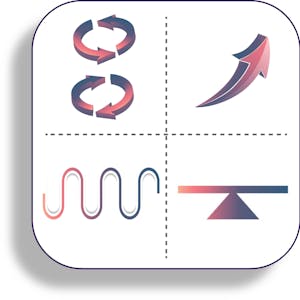Introduction to Economic Theories
About this Course
Wondering why economists have not predicted serious financial crises? Shocked by economic assumptions of human behavior as self-centered and focusing only on what can be measured? Asking yourself if there are no sensible economic alternatives to free markets? Then you are at the right place to learn economics! This is the first online course that teaches economics from a pluralist perspective. Economic pluralism means that a plurality of theoretical and methodological viewpoints is regarded as valuable in itself and is simply the best way in which economics can make progress in understanding the world. This MOOC will illustrate economic pluralism not only in substance but also in form. You will see not only me, a Professor of Economics, but also a pop-up Prof of our business school, who illustrates the actor perspective of firms, government and civil society. And you will meet an online student, based in Greece, who will help you through the tutorial videos in which I will explain key concepts, tools and techniques. I will not limit myself to the dominant theory, as almost every other course does. Instead, I will introduce you to four very different economic theories for the whole set of standard topics in microeconomics and macroeconomics. The theories are presented every time from broad and more interdisciplinary to narrow and more mathematical. The four theories that I like to introduce you to are Social Economics, Institutional Economics, Post Keynesian economics and, at the very end of each topic, Neoclassical Economics, for the special case of ideally functioning markets. But not everything is different in this course. Like every economics course, it includes numbers, diagrams, tables, equations, and some calculations. Why would you go through the effort of learning the basics of four theories instead of one? Because it will help you to see why many economists cannot predict crises, whereas others can see signals but are often not being listened to because they do not belong to the dominant school of thought. It will also enable you to see that it is just one theory claiming economic agents to be self-centered and focusing on the measurable only. Other economic theories go well beyond these limitations. And, finally, the pluralist approach will provide you with policy alternatives to neoliberalist policies promoting free markets. The objective of this course is twofold. First, to enable you to understand different economic viewpoints, linked to important traditions in economic thought, and basic economic concepts belonging to these theoretical perspectives. Second, to enable you to do some basic economic calculations that are important in economic life, such as calculating an inflation rate, and in economic policies, such as estimating the rough gains from trade for both trading partners, and in economic arguments, such as in calculating utility maximization with given prices and budgets. Please note that if you do all course elements, total course load is likely to be 4 ECT (approx. 134 hours). I hope you will enjoy the course!Created by: Erasmus University Rotterdam

Related Online Courses
This course is intended for blockchain developers, auditors, compliance officers, CTOs, and tech executives seeking to upskill in secure contract writing, blockchain compliance, blockchain... more
This specialization is intended for people without programming experience with JavaScript frameworks and who seek to develop web application and security skills. In these four courses, you will... more
This course is designed for novice learners wanting to understand the basics of ISO and IEC security standards. Learners will gain understanding how security standards address the challenges facing... more
This specialization provides the expertise to design and manage sustainable urban transportation systems, consisting of three courses focusing on metros, airports, and highways. The \"Metro Rail... more
This course focuses on examining various practical applications of the fundamental financial analysis and valuation techniques employed in the investment banking industry. Specifically, we will... more





